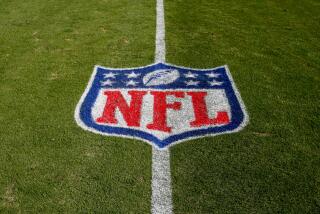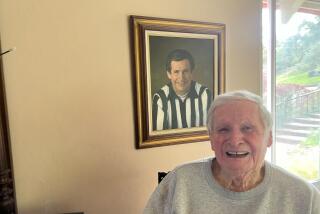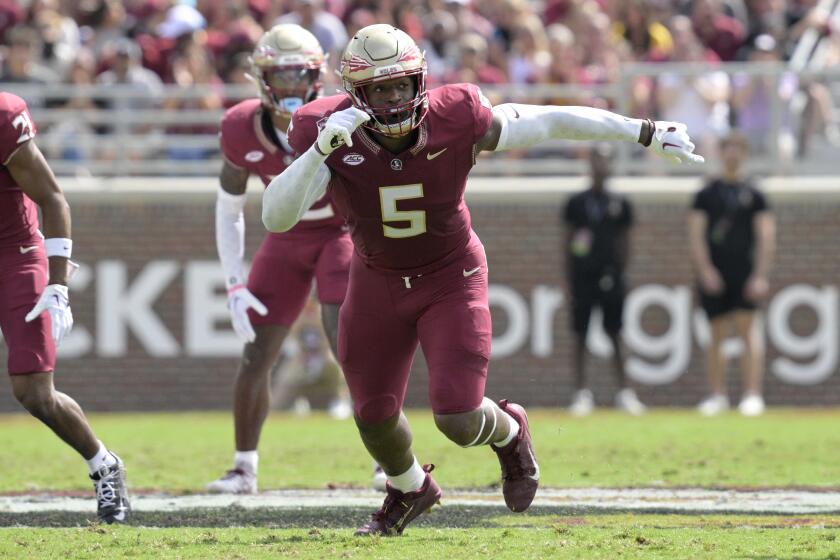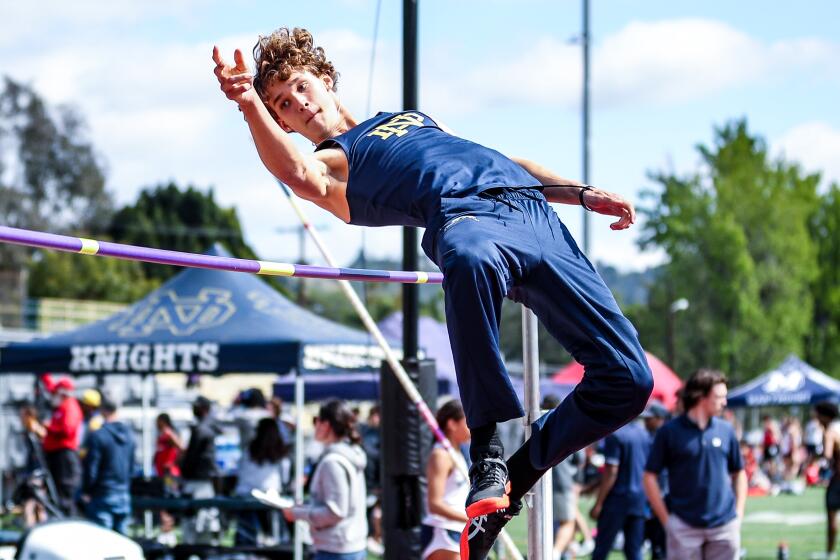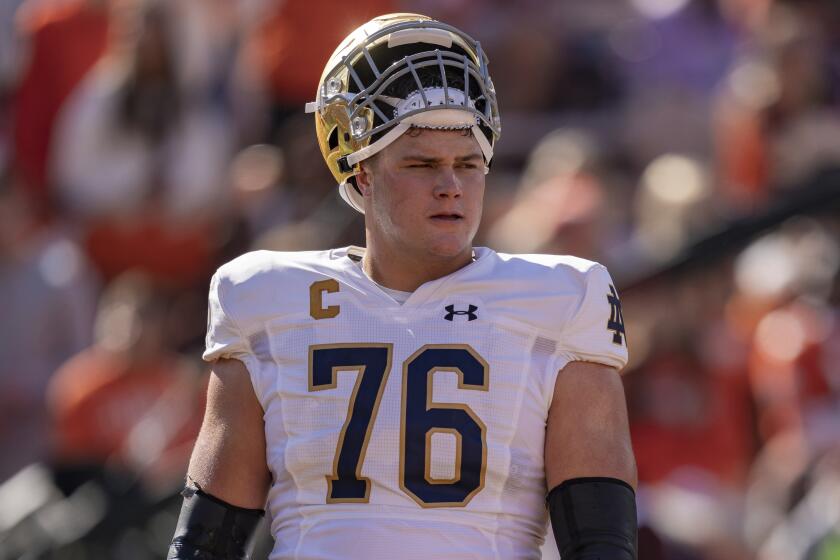Column: NFL players, coaches are sounding off about TV microphones on linemen
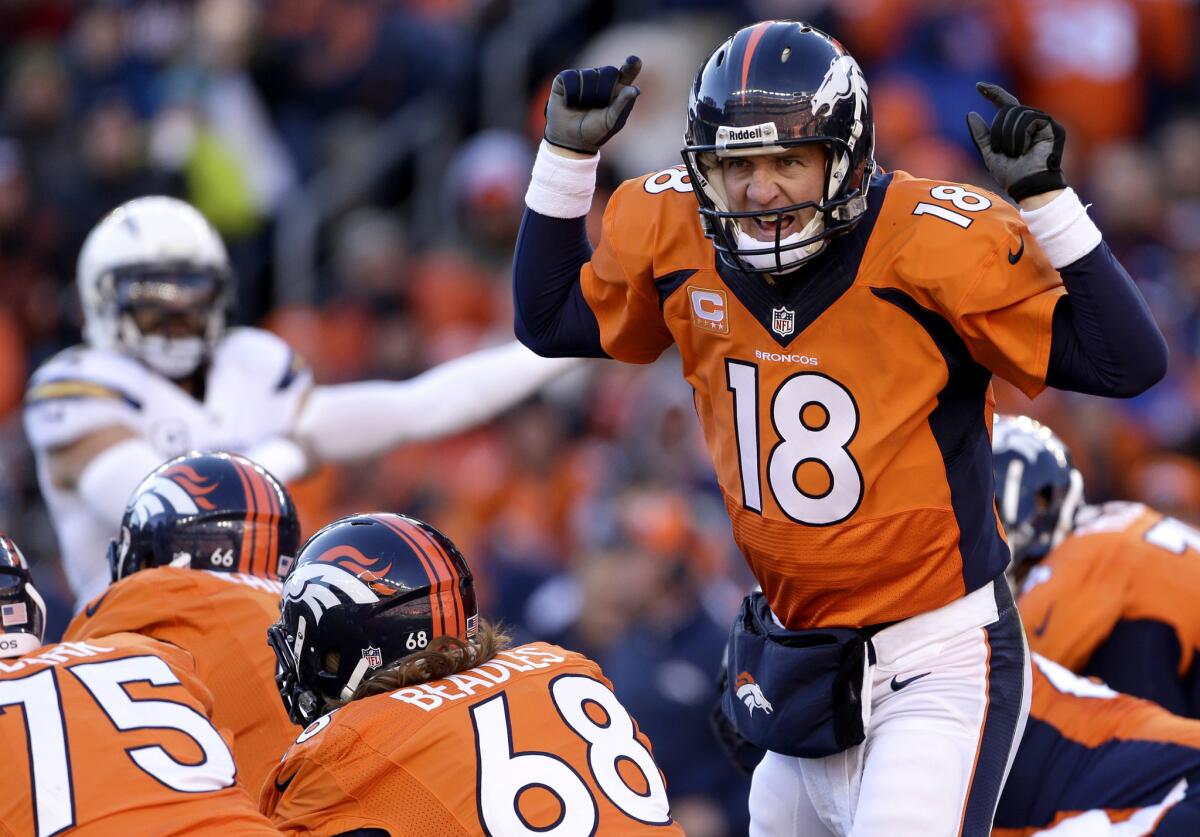
Silence is golden.
In the NFL, it’s also a pipe dream.
Denver’s Peyton Manning is not happy about the league’s policy of wiring offensive linemen with microphones to pick up audio at the line of scrimmage to enhance TV broadcasts. And he’s not alone. It’s the reason viewers can hear the Broncos quarterback famously bark “Omaha! Omaha!” so clearly that when the home crowd is hushed at Sports Authority Field, it sounds as if Manning is yelling in an empty gymnasium.
The practice of taping a tiny microphone to the back of a center or guard began in 2011, replacing the procedure of attaching them to the bill of the umpire’s cap. When, for safety reasons, umpires were moved from the middle of a defense to behind the quarterback, the league needed to find an alternative.
But one man’s “Hurry! Hurry!” is another man’s “Hassle! Hassle!”
“I’m against it,” said Manning, whose team will open at home Sunday night against Indianapolis. “You used to watch the game film and watch the opponent’s game film, and now we’re spending time watching the TV copy. And now they’re trading them. The video guys, not only are they sending the silent copy as I call them, but they’re sending the TV copy.”
That creates all sorts of extra work for players and coaches, who are constantly coming up with new code words to install and memorize, both for plays and to alert the offense of the snap count in a no-huddle situation.
“We’re a no-huddle offense; we’ve got to do everything at the line of scrimmage,” said Adam Gase, Denver’s offensive coordinator. “It’s hard enough to do it when guys are listening within the game. Now, if they can go in and they’ve got a head start on it? It just screws our offense up.”
Obviously, Denver has done more than limp along. Manning collected a slew of NFL individual single-season records last season, among them 55 touchdown passes, 5,477 yards passing, and nine four-touchdown passing games; and the Broncos set NFL team records with 606 points, 76 touchdowns, and five players with at least 10 touchdowns each.
Gase and Manning, who spoke to The Times about the topic this summer, devote hours each week coming up with and installing new code words. The walls of the coordinator’s office are covered with words, ones that relay the hundreds, if not thousands, of play possibilities and variations.
“I’m on Dictionary.com, Scrabble.com, now I’m on some website where it’s names of twins,” Gase said. “Now I try to find things that entertain [Manning], so I’ll try to find things I know he likes.
“If you’re a new guy coming in, I’ll say, ‘Here’s what the word is. It’s this because the code word means this, and that’s because this means this and this. … They’re like, ‘Oh, my gosh.’ It’s like Latin.”
The Broncos are far from the only ones who shake their heads in annoyance at the extra work, all in the name of getting better sound for TV.
“I’m totally against it,” Arizona Cardinals Coach Bruce Arians said. “I know it’s great for the fans, but when you’re running a no-huddle offense or your two-minute drill, and everybody’s got your code words, guys can’t learn new code words every week. It’s not that easy.”
Arians, former offensive coordinator in Pittsburgh, said microphones at the line of scrimmage were partly to blame for the Steelers losing a pivotal game against AFC North rival Baltimore, 23-20, in Week 8 of the 2011 season.
“We lost home-field advantage because Baltimore had somebody who was sitting and listening to all the TV copies,” he said. “They tried to match those up to a play. We had an audible that was a quick screen, and [Ravens linebacker] Terrell Suggs stepped up and intercepted it. That was going to be a walk-in touchdown. And they had the code word, and they got it off the mics.
“It sounds great for the fans and all that, but it makes a big headache for coaches.”
San Diego’s Philip Rivers said a quarterback has to strike a balance between protecting code words and panicking if the meaning of one is discovered by the opposition.
“We call it, don’t chase ghosts,” Rivers said. “You don’t want to get carried away. ‘Oh, they know this. They know this.’ It’s, well, let’s see if they know it. … Sometimes we laugh. You just want to say, ‘Yes! We’re running this play! See if you can stop it.’”
Matt Hasselbeck, backup to Andrew Luck in Indianapolis, recalls his head coach in Seattle would roll his eyes if a quarterback came to him concerned about what code words the competition might know.
Said Hasselbeck: “Mike Holmgren’s thing was, ‘Hey, don’t give the defense too much credit. You’re giving them too much credit. Our guys don’t always know which way to go on offense. How do you think the defense is going to know?’ ”
Just as there are people who oppose the mics, there are influential people who have no problem with them. The concept of wiring NFL coaches and players for sound began in the 1960s, with NFL Films founder Ed Sabol and his son, Steve, devising and perfecting an idea that now is woven into the fabric of the league.
“I think there’s a place for hearing the sounds,” said Dallas Cowboys owner Jerry Jones, a member of the league’s broadcast committee. “Just hearing some of the action that’s going on out there. When you think about boxing, I like the up-close sounds. One of the nice things about boxing is, boy, you can hear them splat every now and then. So I’m into that.
“I don’t have mixed emotion about it as to anything competitively, or anything taken away there. It’s just whether or not you think it’s going over the line show business-wise.”
A defense making an educated guess on a play is one issue, but perhaps a bigger one is the defense knowing the snap-count codes — remember, those must be relayed at the line of scrimmage in a no-huddle — and therefore getting a jump on its pass rush.
“They’ve got everybody’s snap count week to week,” San Francisco Coach Jim Harbaugh said. “I’ve argued that that’s a mistake. Why would we do that? Why would we want to give the snap count to the other team? Do we want more hits on the quarterback?”
Of course, there’s the concept of a defense knowing just enough information to be dangerous to itself.
“We use [code words] to our advantage, especially with the veteran guys,” Broncos Coach John Fox said. “It’s like, you don’t throw a change-up to a bad hitter, you throw one to a good hitter. So you mess with the smart guys. You use the word, they’ve heard it. You use the same signal, but then it’s a different route.
“The smarter the player, the better it works.”
Still, the Broncos and others would vastly prefer the words barked at the line not be broadcast for the world to hear. They were only half-joking when they considered using obscene words for plays so TV wouldn’t use that sound.
Manning offered a different solution.
“I think if you got up there and started saying a lot of really negative things about the commissioner, Roger Goodell, I think they might turn the mics down,” he said with a slight smile. “There might be a heavy fine that comes with it, so maybe a guy like [Green Bay’s] Aaron Rodgers or [Atlanta’s] Matt Ryan, some of these guys with these $22-million contracts, maybe they’re the ones who ought to do it.
“And maybe I’ll send them a little money to help pay the fines.”
More to Read
Get our high school sports newsletter
Prep Rally is devoted to the SoCal high school sports experience, bringing you scores, stories and a behind-the-scenes look at what makes prep sports so popular.
You may occasionally receive promotional content from the Los Angeles Times.

